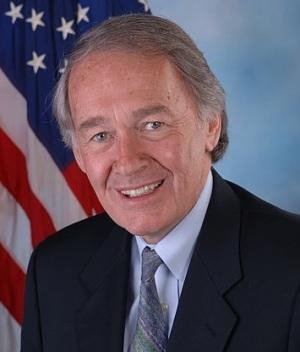Wed, Mar 22, 2017
Authors Say Bill Would Protect Citizens From Invasions Of Privacy By Government And Private Drones
Senator Edward J. Markey (D-MA) (pictured) and Rep. Peter Welch (D-VT) hae introduced bicameral legislation in the United States Congress to establish safeguards to protect the privacy of individuals from the expanded use of commercial and government drones. The Drone Aircraft Privacy and Transparency Act will ensure standards for informing the public about the location, timing and ownership of unmanned aerial vehicles.

The authors say the legislation also will require privacy protection provisions relating to data collection and minimization, disclosure, warrant requirements for law enforcement, and enforcement measures in the licensing and operation of drones. The FAA estimates that as many as 2,700,000 commercial unmanned aircraft systems will be sold each year in the United States by 2020. The lawmakers introduced similar legislation in the last Congress.
“Drones flying overhead could collect very sensitive and personally identifiable information about millions of Americans, but right now, we don’t have sufficient safeguards in place to protect our privacy,” said Senator Markey, a member of the Commerce, Science and Transportation Committee. “The Drone Aircraft Privacy and Transparency Act requires transparency in domestic drone use and adds privacy protections that ensure this technology cannot and will not be used to spy on Americans. I thank Rep. Welch for his partnership on this legislation that will help ensure that we’re not flying blind when it comes to drone privacy.”
“As the presence of drones in our airspace becomes more commonplace, Americans are rightly growing concerned about their privacy,” said Rep. Welch. “Drones are a valuable tool for commerce, law enforcement, and public safety as well as a fun hobby. Our statutes must be updated to reflect the emergence of this soon-to-be ubiquitous technology to ensure privacy and transparency in their operation and use.”
The Drone Aircraft Privacy and Transparency Act would:
- Prohibit the FAA from issuing drone licenses unless the license application includes a data collection statement that explains who will operate the drone, where the drone will be flown, what kind of data will be collected, how that data will be used, whether the information will be sold to third parties, and the period for which the information will be retained.
- Require law enforcement agencies and their contractors and subcontractors to include an additional data minimization statement that explains how they will minimize the collection and retention of data unrelated to the investigation of a crime.
- Require that any surveillance involving drones by law enforcement agencies will require a warrant or extreme exigent circumstances.
- Require the FAA to create a publicly available website that lists all approved licenses and includes the data collection and data minimization statements, any data security breaches suffered by a licensee, and the times and locations of drone flights.
(Source: Congressman Welch news release. Image from file)
More News
Aero Linx: Transport Canada We are a federal institution, leading the Transport Canada portfolio and working with our partners. Transport Canada is responsible for transportation p>[...]
Gross Navigation Error (GNE) A lateral deviation from a cleared track, normally in excess of 25 Nautical Miles (NM). More stringent standards (for example, 10NM in some parts of th>[...]
From AirVenture 2017 (YouTube Edition): Flight-Proven Booster On Display At AirVenture… EAA AirVenture Oshkosh is known primarily as a celebration of experimental and amateu>[...]
Aircraft Parachute System (CAPS) Was Deployed About 293 Ft Above Ground Level, Which Was Too Low To Allow For Full Deployment Of The Parachute System Analysis: The day before the a>[...]
Also: 48th Annual Air Race Classic, Hot Air Balloon Fire, FAA v Banning 100LL, Complete Remote Pilot The news Piper PA-18 Super Cub owners have been waiting for has finally arrived>[...]
 ANN's Daily Aero-Linx (06.29.25)
ANN's Daily Aero-Linx (06.29.25) ANN's Daily Aero-Term (06.29.25): Gross Navigation Error (GNE)
ANN's Daily Aero-Term (06.29.25): Gross Navigation Error (GNE) Classic Aero-TV: Anticipating Futurespace - Blue Origin Visits Airventure 2017
Classic Aero-TV: Anticipating Futurespace - Blue Origin Visits Airventure 2017 NTSB Final Report: Cirrus SR22
NTSB Final Report: Cirrus SR22 Airborne Affordable Flyers 06.26.25: PA18 Upgrades, Delta Force, Rhinebeck
Airborne Affordable Flyers 06.26.25: PA18 Upgrades, Delta Force, Rhinebeck



